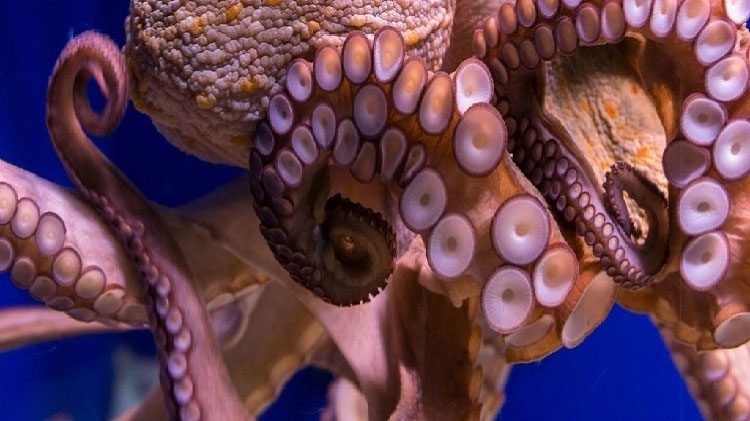About 350 million neurons are located along the tentacles, enabling octopuses to react swiftly to their environment even when severed.
The closest common ancestor we share with octopuses existed 500 million years ago. Why do they exhibit so many similarities to humans while also appearing “alien”? Despite having numerous tentacles with many suckers, lacking bones, octopuses possess eyes, brains, and curiosity just like us.
In both historical texts and behavioral studies, the intelligence of octopuses has always held a significant position. They have the ability to perceive through mechanisms of reception, processing, transformation, memory, and decision-making.
From a behavioral perspective, the ability to adapt and adjust behavior to fit new circumstances is a hallmark of good cognitive ability. Many studies have shown that octopuses exhibit high behavioral flexibility, whether in their native environment or in a laboratory setting.

Tentacles are where many neurons are concentrated in octopuses. (Photo: Science Alert).
New research on the quick response capabilities to prey and predators has recently been published by scientists at the 2019 Biological Sciences Conference held at the end of June in the United States. The study focused on the Giant Pacific Octopus (Enteroctopus dofleini) and the Red Octopus (Octopus rubescens). They possess about 500 million neurons, with approximately 350 million neurons located along their tentacles. This allows octopuses to respond swiftly to their environment and surrounding factors like predators and prey.
“The octopus brain cannot control its eight tentacles and their complex movements. The tentacles only need to send information to the brain without requiring processing from it,” said neuroscientist Dominic Sivitilli from the University of Washington.
The research team used behavioral tracking and neural recording techniques to gain a deeper understanding of how the neurons in the tentacles receive and process information when the octopus moves to hunt and explore. They discovered that the suckers and sensory organs of the octopus are highly sensitive, processing information rapidly and signaling the octopus to take action without the brain’s intervention.
These studies have demonstrated that the brain and tentacles of the octopus operate completely independently of each other. Even when severed, the tentacles can still move and function.
Intelligent, but not the smartest
Octopuses meet all criteria for assessing intelligence: the ability to gather information flexibly, learn, process information, remember, and adapt to circumstances. However, their responses can be quite erratic, especially in tasks requiring image discrimination, with an accuracy rate of only 80%, while other species achieve 100%.
They can be very clever, but only like mischievous students. If we consider the group of cephalopods as a classroom, then the cuttlefish would be at the top of the class. Although cuttlefish are not common, they are currently the subject of many major research projects. They have the ability to learn complex rules and apply them perfectly.




















































